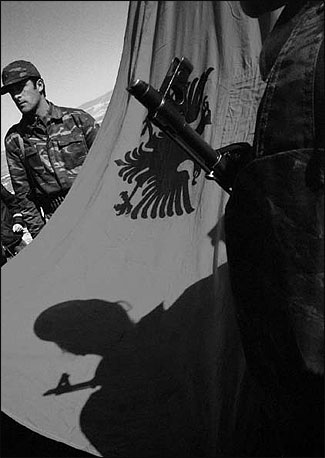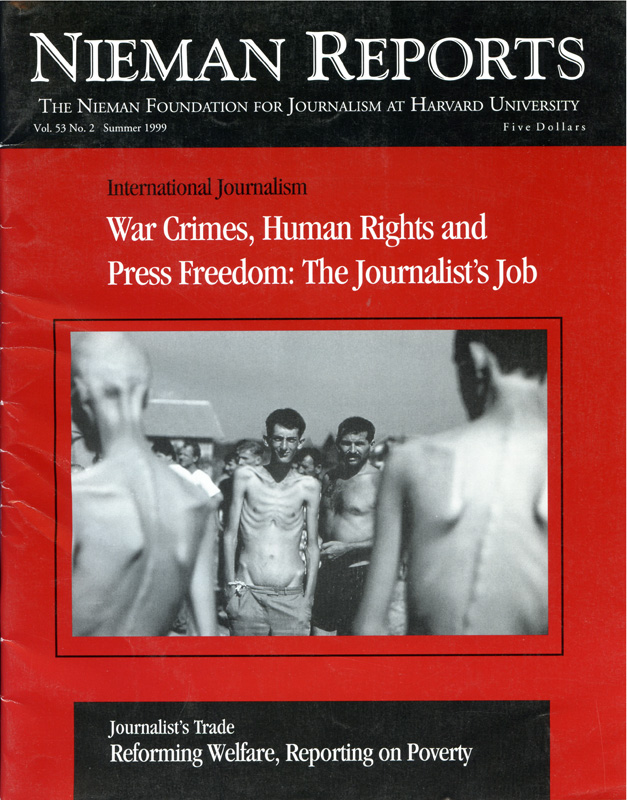
A shadow of an ethnic Albanian Soldier cast on the Albanian flag during a memorial service held to commemorate the killing of 24 people by Serb police. Photo by David Brauchli/The Associated Press.
On the 24th of March, NATO airplanes began their campaign against Serb forces in Kosovo and in all the territory of what we call “Federal Republic of Yugoslavia.” On the same night, Serb paramilitaries—or militaries—or police, it doesn’t matter after all, attacked the premises of the Albanian Daily KOHA Ditore, in Pristina, capital of Kosovo. The night guard was killed. The computers were smashed. The archives destroyed. The printing house was destroyed, too.
Everything burned down.
“Don’t go in the office,” I recall my colleague telling me on the phone the next day. “Rexha [our night guard] was murdered. Everything was destroyed. And, they [Serbs] might be after us.”
This did not come as a surprise to us. Only four days earlier we were in court, involved in a trial against KOHA Ditore and its editor-in-chief. On that Sunday, when all state and public institutions were closed, the court rendered the verdict against us.
It said that we were disseminating ethnic hatred. One of the stories that was found to be incriminating was a story taken from the Serbian news agency BETA. It was a story that even Belgrade state TV ran. Only when it appeared in our paper, it became incriminating.
It didn’t matter that our solicitors gave arguments that this trial was illegal and gave strong arguments for it to be at least postponed. The judge simply replied, “I must finish this today!” Even before this, we knew that we were considered “an obstacle” to the Belgrade regime. And we were happy about that.
Actually, being “an obstacle” to the regime in Belgrade was our main motive in our work.
“KOHA Ditore, a radical Albanian newspaper…,” a journalist once wrote about us from London. And yes, we were radical. We were radical in our demand to change the way things were going in our country. We were against hate and war and violence.
For two years, since April 1, 1997, when we published the first issue of KOHA Ditore, we wrote about everything that was happening in Kosovo and in Belgrade. Telling it all. Speaking loudly, and because of this approach the life we had was anything but normal. In the beginning, we sold 5,000 copies a day. After five months, we were selling 30,000 copies each day.
In March 1998 the first massacre took place in one of the villages of Kosovo. Twenty-one people were killed. A pregnant woman was among them. And we were there to take pictures of her. They were published in our paper the next day. The horrible pictures of a pregnant woman, who was described by her killers as a “terrorist,” were on our Web site, too, and so people throughout the world could see it.
At that moment we knew that war had really started in our homeland, although the signs of it had been obvious for years. In Belgrade, there was a regime whose policies had resulted in thousands of ethnic people becoming victims and refugees during the last 10 years in the former Yugoslavia. Power resided in a man whom Western politicians were calling a peacemaker. We knew he was a criminal.
Since then, we have reported about killings, violence, repression, all that has become our reality. We tried to remain objective—if something like this exists. This means that we tried to represent the views of all sides in conflict, without commenting on anything. We still believed that diversity of cultures, religions, opinions adds richness to our lives and is not a reason for hatred and blood feud.
We were there only to report. We even stopped publishing editorials in the newspaper, because we didn’t want to engage directly in the events. What we wrote was criticized by everyone and yet our paper was read by all. This was a good sign, we said.
Journalists who worked for KOHA Ditore were usually prevented from getting information by Serb police. Luckily they would only be turned back at the first police checkpoint, and they were only psychologically mistreated, rarely beaten up. Then we discovered a different way of getting the information we wanted to report—some of our journalists went to work as interpreters for foreign journalists. No longer did they need to tell authorities that they are from KOHA Ditore. Having a foreigner alongside made Serbian police think twice before harassing them. And for our colleagues from abroad, this meant they would have an interpreter who was also a journalist, so they could help each other to get the story. We all benefited from this arrangement.
In October 1997, a draft was being prepared for a settlement on Kosovo. There were 15 Albanians on the negotiating team, representing all Albanians of Kosovo. By the time the negotiations ended, there was only one left—the one who only said “yes” to everything. And he was negotiating the settlement. Everything was done in secret. We got hold of the draft, and of course we published it.
People were furious. Those who prepared the draft and also Albanians of Kosovo. The ones who prepared the draft because they didn’t achieve what they wanted—to go back home as successful politicians who would have successful careers in their country.
The ordinary people were furious because they didn’t believe that after all that had happened, the solution to be found wouldn’t even mention the name Kosovo, and wouldn’t give any form of self-government to Albanians of Kosovo.
After this, the draft had to be changed substantially. We showed to all that we were to be asked about Kosovo, as well. Now we had even more enemies, but they knew that they would have to fear us even more. We were on nobody’s side.
After all this, I thought to myself: “This is not a joke. This is our future that we are talking about. And I’m only 25. I still have a life to live and I want to live it. I didn’t have a life until now.”
During the days following the NATO air strikes, I had to go into hiding. The phone lines were cut, and I lost all the connections with my colleagues from the office. On the second week of the air strikes, I found myself among thousands of other deportees waiting to cross the border with Macedonia. So were many of my colleagues.
Eventually some of us met in Tetovo, a small town in western Macedonia. And, of course, we decided to revive KOHA Ditore. “We will survive,” we said. After four weeks of not being published, KOHA Ditore appeared again. Now we are living and working in exile, in Macedonia, among tens of thousands of deportees from Kosovo. “This is about survival,” I say to myself. “The survival of KOHA Ditore as an institution, but also of Albanians of Kosovo as an entity.”
Our political and social structures were all crushed and disintegrated. We were collapsing as a nation, losing our identity as a people. We had to enable our voices to be heard, voices calling for rebuilding our political and social structures. This is the only way we will survive.
Now we have a funny office in Tetovo. Some 13 computers—for the journalists, editors and layout people—are placed on top of some very uncomfortable tables. We don’t have a phone at all, but even if we did there is no way to connect it to phone service. By coincidence, an Internet cafe is located beneath our office, and now there is a cable that goes from our office into this Internet cafe. This is our only connection with the rest of the world. Some colleagues from our office in Pristina are here. We work every day, seven days a week, without being paid, and when my workday ends I must look for a place to stay. For now, I am homeless. But for us, publishing the paper is all that matters.
Other colleagues are missing. They are somewhere in Kosovo. Hopefully, they are still alive, in hiding or running. But surviving.
Ardian Arifaj is Editor of KOHA Ditore, a daily Albanian-language newspaper that was widely read in Kosovo and is now being published in Macedonia.



